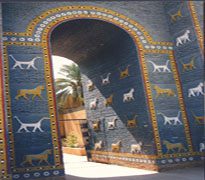National Tourism Strategy Iraq
Assessment and Recommendations for Rebuilding Iraqi Tourism
What
Iraq has long been considered the cradle of civilization, the Biblical Fertile Crescent. Iraq is home to some of the greatest ancient sites in the world. In addition to Babylon and other world renowned archaeological sites, there are in Iraq some of the most significant shrines in Shiite Islam, and sites associated with Judaism and Christianity. The riverine areas of the Tigris and Euphrates valleys and the now partially restored, beautiful marsh areas of the south offer potential for ecotourism. No doubt many well situated sites and structures that belonged to the former regime could also eventually be converted to commercial and recreational use as a tourism industry reemerges.
Most of the businesses and services that would support expanded travel and tourist activity in the future were, at the time of this project (2006-07), already significant parts of the Iraqi economy. They were important potential generators of hundreds of new businesses and thousands of jobs even in the near term.
The USAID-funded Izdihar Project was established to assist with the reconstruction of Iraq’s economy, including the tourism sector. This assignment focused on short, medium and long strategies for leveraging existing and future interest in tourism all across the country. Even during the height of civil conflict and strife, tourism continued, mainly religious tourism to Shiite sites.
This assignment produced a detailed strategy that examined the nature and condition of those sectors in the Iraqi economy that were traditionally part of the hospitality, travel, and tourism industries. Special emphasis was placed on those that could contribute to job creation and economic growth in the short and medium terms, irrespective of national tourism plans, programs, and policies.
The strategy detailed the following:
- The state of existing service businesses and industries such as hotels, restaurants, car and bus services, travel agencies, training for the hospitality and culinary industries, and other important services that serve domestic society and could eventually support an expanded travel industry;
- Summarized key factors that would promote or inhibit development of the sectors analyzed, making reference to existing infrastructure, organizations, and associations;
- Recommended specific actions at the policy, legal, and regulatory levels.
- Prepared recommendations for technical assistance, including for trade and business associations;
- Analyzed development techniques for the relevant sectors, with reference to models in the region, and elsewhere as appropriate;
- Analyzed the potential impact on the local economy and the creation of jobs

- Developed a long term post conflict strategy for the sustainable development of tourism in Iraq.
- Created an action plan for immediate protection of cultural heritage sites in Iraq.
- The longer term tourism strategy included a strategy for leveraging the protection of cultural heritage for national tourism development.
- Action plan for multi-denominational religious tourism term tourism strategy.
